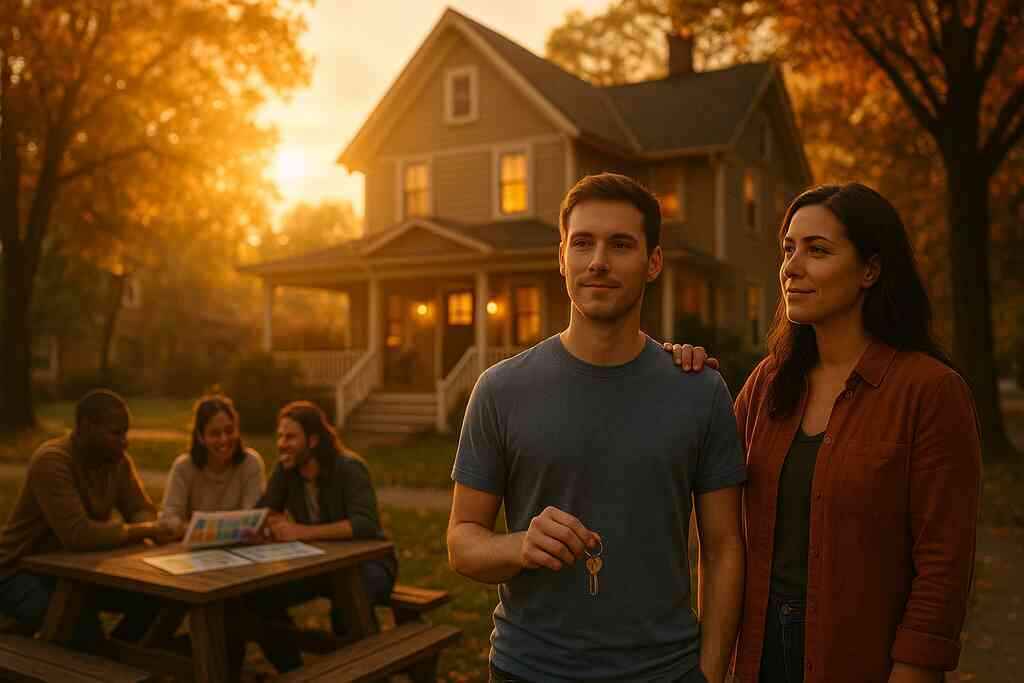
Understanding Top Sober House Dynamics in Georgia
October 20, 2025
Introduction to the Georgia Sober Living Experience
Navigating the Journey to Sobriety in the Peach State
Georgia, affectionately known as the Peach State, offers a uniquely supportive environment for individuals embarking on their path to recovery in Georgia. The state’s rich culture, warm community, and scenic landscapes provide a backdrop for a transformative sober living experience. Achieving long-term sobriety in Georgia is a journey that requires dedication, resilience, and the right support system. Various sober living resources in Georgia are tailored to help residents overcome the challenges of addiction and transition to a sober lifestyle. These resources include structured sober homes, halfway houses, and supportive peer networks that foster a sense of belonging and accountability.
The Role of Top Sober House in Georgia’s Recovery Landscape
Top Sober House stands as a vital component of Georgia’s recovery landscape, offering comprehensive directories and resources to guide individuals toward achieving sobriety. The role of community support in sobriety is pivotal, and Top Sober House facilitates connections that are essential for sustained recovery. By providing access to crucial information about sober living houses, they help individuals navigate the vast array of available sober living environments. This approach not only aids in early recovery but also ensures that individuals have the tools needed for ongoing sobriety. With a focus on providing a safe and structured environment, Top Sober House supports the transformative journey from addiction to wellness.
Defining Sober Living Dynamics in Georgia
The dynamics of sober living in Georgia are defined by a blend of structure, community support, and personal responsibility. Understanding sober living houses is crucial to appreciating the robust frameworks they provide for individuals in recovery. Georgia’s sober homes create a nurturing environment that encourages healing and personal growth. These houses impose specific rules and foster daily routines that reinforce discipline and commitment to sobriety. The interactions within these communities are grounded in peer support and shared experiences, which are vital for overcoming the obstacles of substance use disorder. As individuals navigate their recovery journey, they benefit from the stability and encouragement offered by their peers and the sober homes’ structured environment.
The Architecture of Sober Living Houses in Georgia
Structured Sober Environments: A Subtle Yet Strong Foundation
The structured sober house environments in Georgia offer a stable and disciplined backdrop that is crucial in early recovery stages. In these settings, the structure is not meant to impose rigid constraints but rather to foster a sense of routine and predictability, which is vital for individuals recovering from substance use disorder. Daily schedules often include time set aside for peer support groups, individual counseling, and wellness activities. House managers play a critical role in maintaining this structure, ensuring that rules are adhered to and that the environment remains conducive to sobriety. The emphasis on discipline and routine not only aids in recovery but also equips individuals with life skills essential for their journey towards long-term healing.
Exploring the Healing Environment and Its Impact on Recovery
A healing environment is pivotal in promoting recovery and well-being. Sober living houses in Georgia provide spaces that are serene and supportive, enhancing the therapeutic process. The natural beauty surrounding many of these residences offers a peaceful retreat, inviting reflection and meditation, which are crucial aspects of recovery. Such environments are carefully designed to reduce stress and triggers that could lead to relapse. By encouraging positive interactions and healthy lifestyle choices, these settings become more than just accommodations-they transform into sanctuaries for growth and recovery. Emphasizing an addiction recovery environment, many of these houses incorporate wellness activities such as meditation and exercise into daily routines to bolster residents’ physical and mental health.
Dynamics of Community Support and Peer Interaction
Community support and peer interaction are foundational aspects of sober living, particularly in the context of addiction recovery in a community setting. In Georgia, sober living homes emphasize the creation of peer networks for addiction recovery, fostering an environment where shared experiences serve as a powerful motivator. The social bonds formed within these communities provide a network of accountability and encouragement, crucial for overcoming addiction’s challenges. Frequent group meetings and social activities are organized to promote camaraderie and shared responsibility. Such dynamic interactions not only provide emotional support but also promote personal accountability, helping residents stay committed to their sobriety goals. Through these connections, individuals learn to navigate their recovery path, supported by the strength and empathy of their peers.
Georgia Halfway Houses: Bridging the Gap Between Rehabilitation and Independence
Halfway houses in Georgia serve as critical transition points for individuals moving from inpatient treatment programs to independent living. These facilities offer a supportive and structured environment while allowing for increased personal freedom and responsibility. Residents are encouraged to pursue employment or education and participate in community service, which aids in building a sense of purpose and achievement. The halfway house model is designed to gradually reintroduce individuals to everyday responsibilities while maintaining a supportive framework. This bridge between rehabilitation and independence is essential for preventing relapse by providing the necessary tools and support systems, thus ensuring a smoother transition to a substance-free life. As part of Georgia’s comprehensive sober living resources, these halfway houses play a vital role in the rehabilitation journey, helping individuals rebuild their lives with confidence and autonomy.

Unraveling the Path to Long-Term Sobriety in Georgia
Sober House Rules and Their Influence on Residents
In Georgia’s sober living homes, rules are not merely guidelines; they are the backbone of the recovery process. These sober residence rules and impact create a framework within which residents can rebuild their lives with discipline and focus. Rules typically cover aspects like curfews, attendance at group meetings, and participation in household chores. Such regulations ensure that residents maintain a consistent routine, which is critical in fostering accountability and responsibility. By abiding by these rules, individuals learn to manage their time and resources effectively, a skill that is invaluable as they transition back into independent living. Thus, these structured environments contribute significantly to the sustainability of the recovery journey.
The Importance of Daily Routines and House Managers
The role of daily routines in recovery cannot be overstated. Structured daily activities, such as those orchestrated by experienced house managers, provide residents with a stable foundation for their recovery efforts. The importance of daily routines in recovery stretches beyond mere time management; it imbues a sense of purpose and achievement. House managers, acting as mentors and guides, ensure that these routines are adhered to and optimized for each resident’s needs. They facilitate activities that encourage growth, such as cooking classes, exercise regimens, and art therapy, all aimed at enhancing life skills and emotional well-being. As residents adapt to these routines, they develop resilience and self-discipline, crucial attributes that support long-term sobriety.
Integrating 12-Step Meetings and Treatment Programs for Comprehensive Care
Integration of 12-step programs and treatment programs into the daily regimen of sober living homes in Georgia is essential for a holistic recovery approach. These programs provide a structured framework where residents can reflect on their past behaviors, understand their addiction, and build a future devoid of substance use. Attending Alcoholics Anonymous meetings is often encouraged as part of this integration, fostering a sense of community and mutual support. The synergy between structured sober housing and these programs ensures that participants have a comprehensive network of support, which addresses both the psychological and social facets of addiction. This combination nurtures an environment where healing is possible, providing residents with the tools and strategies they need for lifelong recovery.
Utilizing Supportive Peer Networks for Sustained Recovery
In Georgia, the cultivation of peer networks for addiction recovery is a cornerstone in fostering sustained sobriety. These networks function as an extended family for residents, offering unwavering support and encouragement. Through shared experiences and collective problem-solving, individuals find solace and strength in knowing they are not alone in their struggles. Regular group meetings, social events, and peer-led discussions provide platforms for exchanging advice, offering guidance, and developing actionable recovery skills. This interconnectedness not only reinforces commitment to sobriety but also enhances emotional resilience. The bonds formed within these networks often transcend the confines of the sober house, becoming lifelong connections that continuously inspire and motivate recovery efforts.
Challenges and Triumphs on the Road to Recovery
Overcoming Early Recovery Obstacles in a Supportive Environment
Entering a sober living home in Georgia marks the beginning of a monumental journey. The challenges of early recovery are profound, requiring resilience and determination to navigate successfully. In supportive environments, such as those elaborated by Top Sober House, individuals find the structure and comfort necessary to face these obstacles head-on. This framework encourages residents to build new routines that are devoid of triggers associated with past substance usage. Supportive networks within these environments provide emotional strength, helping residents resist the temptation to relapse by offering a strong foundation of accountability.
These environments are not without their unique challenges, which often require careful navigation. Settling into a new community and adhering to house rules can initially seem daunting. However, the supportive nature of Georgia’s sober homes ensures that individuals are not alone in this process. Peer support groups and compassionate house managers guide residents through daily challenges, facilitating discussions and activities that bolster confidence and motivation. By addressing these early recovery obstacles in a nurturing atmosphere, residents can develop a strong foundation for lasting sobriety, leaning on their communities for sustenance and courage.
Balancing Structure and Freedom in Transitional Living
Transitional living, such as the setup found in Georgia’s structured sober house environments, strikes a delicate balance between structure and freedom. Residents are encouraged to follow specific rules while simultaneously exploring newfound liberties that support their personal growth and independence. This balance is crucial for fostering the confidence necessary for individuals to transition smoothly into a substance-free life outside these homes.
Understanding the dynamics of this balance can be challenging, but the combination of structured environments and personal freedom is key to success. Transitional homes in Georgia integrate house rules that promote stability, such as curfews and attendance in group meetings, with the freedom to pursue employment or educational opportunities. The structured environment ensures all activities align with recovery goals, while the freedom to explore personal interests strengthens self-esteem and autonomy. Successfully navigating these transitional living challenges equips individuals with vital life skills required for enduring sobriety, as they adapt to a lifestyle that embraces both discipline and self-determination.
Success Stories: Achieving Long-Term Sobriety and a New Life in Georgia
The triumphs of sober living house success stories in Georgia illuminate the possibilities of achieving long-term sobriety and building a new life. These stories are invaluable in inspiring hope and demonstrating that the road to recovery, though fraught with challenges, is achievable with the right support systems. Individuals who have successfully navigated the complexities of sober living environments in Georgia often emerge as vital members of their communities, equipped with the resilience and wisdom gained through their journeys.
These success stories are a testament to the efficacy of Georgia’s sober living programs and the robust support structures they offer. Many residents, after embracing a disciplined lifestyle within these homes, find themselves ready to contribute positively to society, supporting others on similar paths. These narratives, often recounting the highs and lows of the recovery journey, underscore the importance of perseverance, community support, and personal commitment. As they achieve long-term sobriety, these individuals pave the way for others, exemplifying how Georgia’s sober living environments can truly transform lives, leading to fulfilling and substance-free futures.

Concluding Thoughts on Sober Living in Georgia
Reflecting on the Journey: From Substance Use Disorder to Wellness
Reflecting on the path from substance use disorder to wellness highlights a profound journey of transformation. In Georgia, where the environment and community play pivotal roles, sober living offers a beacon of hope. This journey is marked by resilience and the collective effort of individuals and support networks who’ve dedicated themselves to fostering recovery. It is a testament to the power of structured environments, such as those found in Georgia’s recovery system, which offer the scaffolding for individuals to rebuild their lives. The experiences and growth garnered through this path are invaluable, proving that with the right support and dedication, a transition to a life of wellness is not only possible but attainable. Individuals emerge not just as survivors but as empowered beings ready to contribute positively to society.
The Future of Sober Living Houses in Georgia’s Recovery Ecosystem
The future of sober living houses in Georgia’s recovery ecosystem looks promising, with innovative models continually evolving to meet the needs of those fighting addiction. These homes are significant contributors to the state’s comprehensive addiction recovery framework, providing critical transitional spaces between inpatient programs and independent living. The integration of modern therapeutic practices and technology, such as virtual support groups, will likely enhance this future. As awareness and education around addiction grow, these homes are poised to set new sober house safety standards, ensuring environments that are both secure and conducive to recovery. With ongoing commitment from communities and policymakers alike, Georgia’s sober living houses will continue to be a pillar of hope and transformation, adapting to the ever-changing landscape of recovery needs.
Encouragement for Those Seeking a Substance-Free Life in the Heart of the South
For those seeking a substance-free life in the heart of the South, Georgia offers a nurturing and encouraging environment. The state’s sober living communities are vibrant and supportive, standing ready to assist individuals at every stage of their recovery. The journey may seem daunting at first, but with access to rich resources and compassionate guidance, it becomes a journey not walked alone. Sober living in Georgia provides a safe place to rediscover personal strengths and build a future that aligns with one’s aspirations of wellness. Engaging with addiction recovery environments tailored to individual needs can facilitate this transformation. Let the scenic landscapes and warm community of Georgia serve as both a backdrop and an anchor, offering inspiration and resilience. Encouragement, when backed by knowledge and community, becomes a powerful catalyst on the road to long-term sobriety.
Frequently Asked Questions
Question: How can Top Sober House support my journey to long-term sobriety in Georgia?
Answer: Top Sober House offers extensive support for individuals pursuing long-term sobriety in Georgia. By leveraging a comprehensive directory of sober living facilities, we provide access to structured environments that are pivotal for recovery. Our platform connects you with peer networks and community support systems essential for overcoming substance use disorder. With a focus on providing nurturing environments, our listed homes offer a stable foundation for your recovery journey, supporting both your physical and mental well-being. Whether you’re seeking Georgia halfway houses or structured sober homes, we guide you every step of the way to ensure a successful rehabilitation journey.
Question: What role does community support play in the success of sober living homes in Georgia?
Answer: Community support is a cornerstone of successful sober living homes in Georgia. At Top Sober House, we recognize the critical role that peer networks and community connections play in fostering long-term sobriety. These supportive networks provide accountability and encouragement, helping residents navigate the challenges of addiction recovery. Through group meetings, social activities, and daily interactions, individuals find strength and resilience in shared experiences. This sense of belonging is not only comforting but also enhances personal responsibility and commitment to sobriety goals.
Question: How do sober house rules contribute to the recovery process in Georgia’s sober living homes?
Answer: In Georgia’s sober living homes, rules are integral to the recovery process. The rules enforced in these environments ensure a structured and disciplined approach to daily living, creating a predictable routine vital for individuals in recovery. By adhering to curfews, attending group sessions, and participating in household responsibilities, residents learn invaluable life skills that reinforce accountability and focus. Top Sober House emphasizes the importance of these structured environments to create a supportive foundation where individuals can rebuild their lives effectively.
Question: In the blog Understanding Top Sober House Dynamics in Georgia, what benefits do structured sober environments offer?
Answer: As detailed in the blog Understanding Top Sober House Dynamics in Georgia, structured sober environments offer numerous benefits that are crucial for recovery. These environments provide a disciplined setting that enhances routine and predictability, crucial for individuals transitioning from substance use disorder to sobriety. Structured communities within these homes support healing by providing stability and reducing triggers associated with relapse. They also integrate wellness activities into daily regimens, promoting both physical and mental health. With the guidance from experienced house managers, residents develop resilience and life skills necessary for achieving lasting sobriety.
Question: Why are Georgia halfway houses considered essential in the journey towards independent living?
Answer: Georgia halfway houses play a critical role in bridging the gap between inpatient treatment and independent living. These facilities provide a supportive structure while allowing residents to gradually embrace personal freedoms and responsibilities. At Top Sober House, we recognize the value of this gradual transition as it offers individuals the opportunity to re-engage with society through employment, education, and community service, all while maintaining a supportive framework. This model prevents relapse by reinforcing the recovery goals set during treatment, thereby promoting a smooth transition to a substance-free life.


